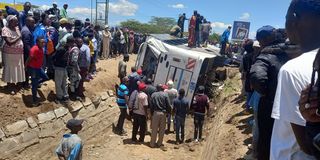Pwani University closed after accident that killed nine students, three staff

The scene on the Naivasha-Nakuru highway, where a Pwani University bus landed in a ditch after colliding with a matatu on March 30, 2023, leaving at least 16 people dead.
What you need to know:
- At least 18 people were confirmed dead on Thursday after a Pwani University bus collided with a matatu at the Kayole Bridge on the Nairobi-Nakuru highway.
- Prof Rajab noted that teaching and learning had been affected and that students may not be in a state of mind to write their end of semester examinations.
Pwani University has been closed until April 17 to allow staff and students to mourn those who died in a road accident in Nakuru County.
Vice Chancellor Mohamed Rajab made the announcement in a statement on Saturday, saying the Senate reached this decision following a meeting the same day.
At least 18 people were confirmed dead on Thursday after a Pwani University bus collided with a matatu at the Kayole Bridge on the Nairobi-Nakuru highway.
Among them were eight students of the university and three staff members. The number of students who died increased from eight to nine on Saturday, after Richard Mabiatu (third year) died at Kenyatta National Hospital.
Also read: 'I love you': Last panic messages of Pwani varsity students in ill-fated bus shared on TikTok
In its notice, the senate asked the students to leave the university by 3pm Saturday.
Prof Rajab noted that teaching and learning had been affected and that students may not be in a state of mind to write their end of semester examinations.
“The Pwani University Senate decided to reorganise the second semester to allow students and staff to mourn, and undergo counselling and trauma management to cope with the prevailing circumstances, and heal,” he said.
He said examinations would begin on May 2 and end on May 12, and that the graduation ceremony for 2019 students would take place in December, while teaching practice and field attachment would start on May 15.
The Senate’s decision comes after demonstrations by students, which started on Thursday night. They were called off after the administration intervened through its leaders, but they resumed on Friday evening, when the students took to the streets, committing offences such as stoning vehicles, until around 11pm.
A student who spoke to Nation.Africa said they confronted police officers after one of them was attacked. The learner said one of them then approached the officers to talk to them but was hit with a gun, prompting the others to step forward and start rioting.
“Police officers came when the students had lit candles in memory of colleagues who died in the accident. The student's mindset changes when they see the police," the learner said.
He added: “Civilians attacked the students. One was cut in his hand with a knife while another was pricked in the neck with a bottle. Students are afraid for their lives, and now the Senate has issued a memorandum with notice. Some do not have fare."
There were also fears that some girls were sexually abused during the riots and the allegation that the Senate had another reason for releasing the students - to keep them from meeting those in Eldoret, Uasin Gishu County.
"We suspect the Senate did not want us to meet with the students who are on their way back. We have information that they have boarded the Standard Gauge Railway,” the student told Nation.Africa.
“The administration did not address us but issued a notice. They left due to fear but many are stranded, especially those in the hostels. The girls will beg for where to stay but what if they do not have friends? They might end up in danger.”
Kilifi North Sub-county Police Commander Kenneth Maina said they dispatched the police to contain the students after they started rioting.
“The students were calm. We do not know what triggered the riot,” he said.
Police were patrolling Kilifi and Kibaoni towns on Saturday.





